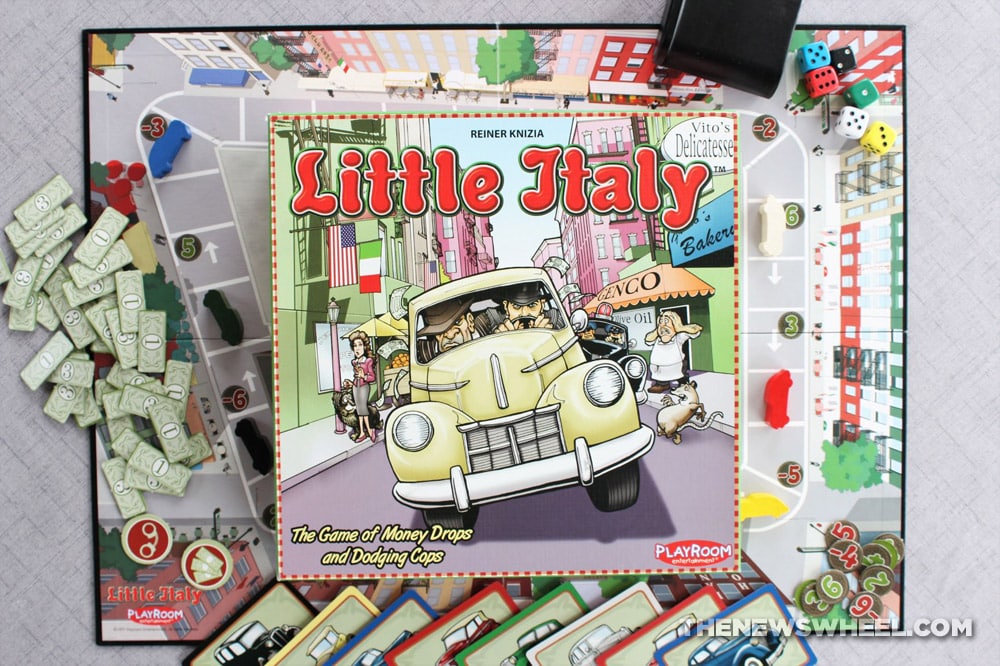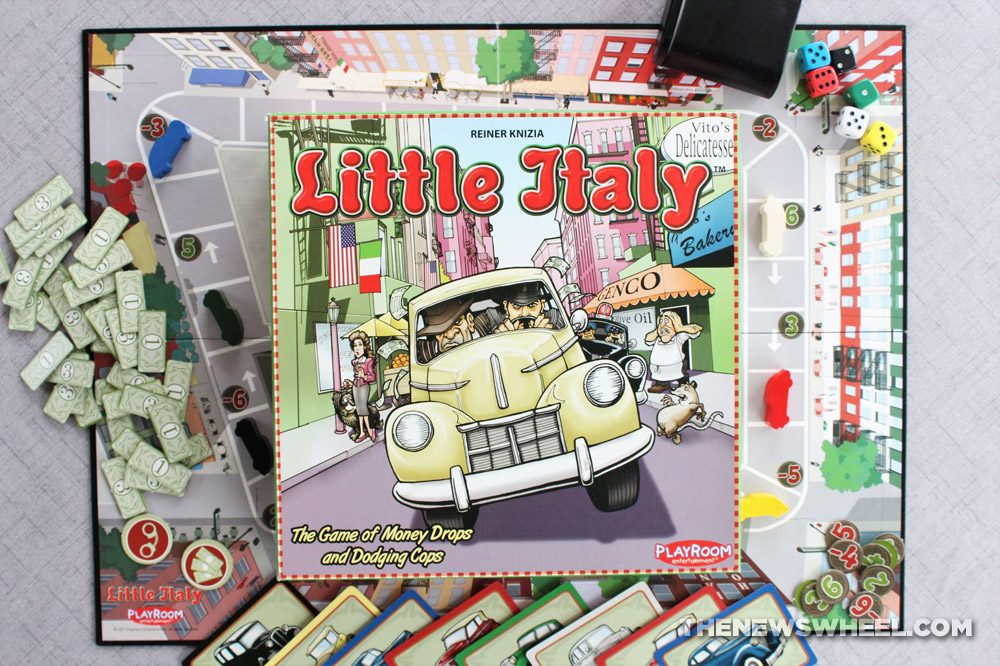 Photo: The News Wheel
Photo: The News Wheel
Interested in trying an odd but enjoyable strategy game with your family? I came across this out-of-print game called Little Italy and thought it might interest you. It’s a deceptively simple roll-and-move game involving mobsters in cars that takes place in the 1950s — a strange topic for a family game, for certain, but it actually is pretty fun. And it’s definitely an improvement on the outdated board games your kids are probably used to playing. Here’s a look at it.
Publisher: Playroom Entertainment
Designers: Reiner Knizia
Release: 2007
Box Dimensions: 10.5″ x 10.5″ x 2.5″
# of Players: 2-6 crafty mobsters
Ages: 10 and older
Category: Dice-rolling & money-collecting
Play Time: 30 minutes
ISBN: 9781932697438
Website: https://shop.ultrapro.com/

The game takes place in — obviously — the streets of New York City’s Little Italy neighborhood. The goal is to be the mobster with the most cash at the end of the game.
Each player has a stake in two cars, sharing ownership of one car with the person on their left and the other car with the person on their right (if you are playing with two or three players, each person individually controls two cars without sharing ownership).
The first player rolls all of the dice, each one a different color to correspond to one of the cars on the board. The player chooses any one die and moves the corresponding vehicle that many spaces clockwise around the board, as determined by the number shown on the die. The remaining, non-chosen dice are given to the next player seated clockwise, who rolls them and selects one. This continues until all but one die are chosen, following which all dice are gathered, and the process begins again.
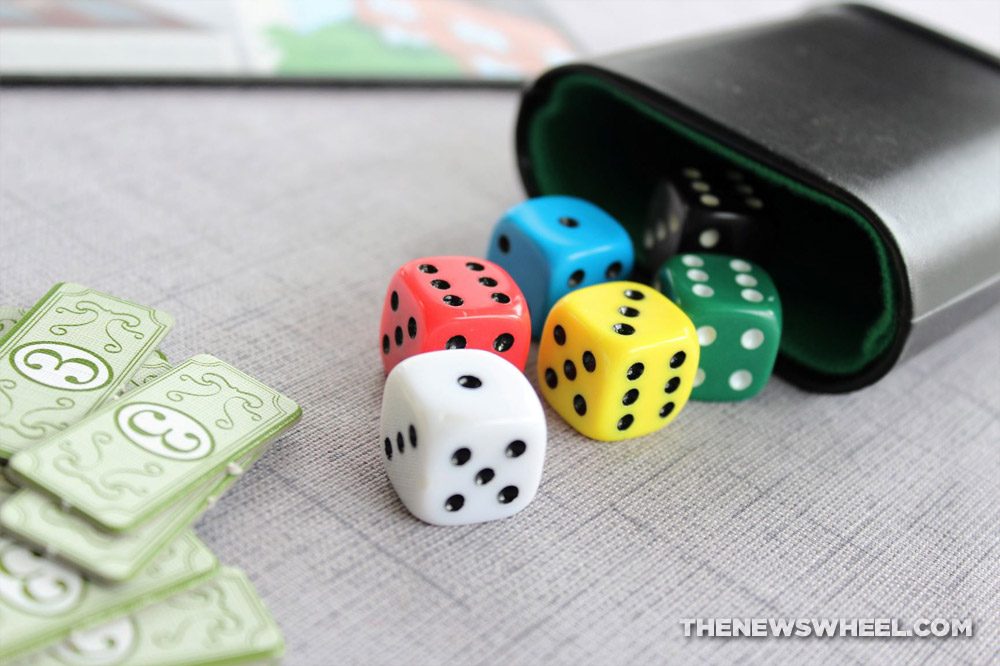
Whenever a car passes into a space with a police or money marker on it, the car immediately stops and payments are distributed or owed. Whichever players have ownership of the car that landed on the space either owe money (if a police space) or receive a cash payout (if a money space). The token is then moved to the next-highest numerical spot on the board until it’s landed on again.
The game ends when both tokens cycle through every designated spot on the board. The player who has amassed the most money wins. There are some other minor rules to movement and payments, but those are the basics of how the game works.
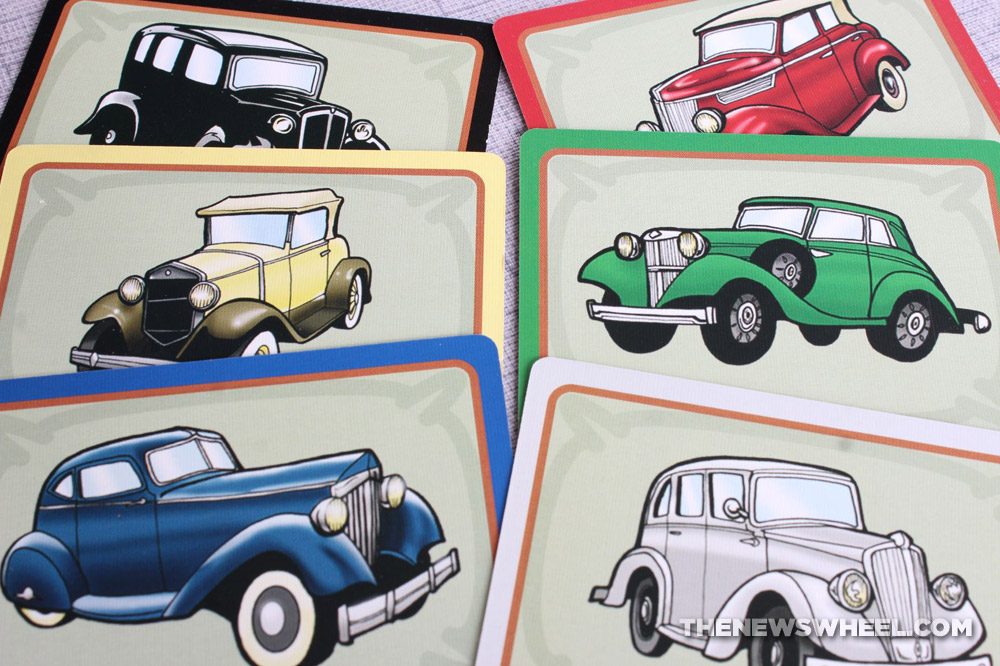
Little Italy includes:
- 1 town square board
- 6 wooden car tokens in different colors
- 6 colored dice
- 1 felt-lined dice cup
- 12 cards identifying car ownership
- 1 police space marker
- 1 money space marker
- 40 cash tokens
- 10 variable scoring discs
For being about the mafia, police evasion, and obtaining money through nefarious means, Little Italy has surprisingly bright-colored, cartoon-like artwork and visual style. Its whimsical color choices and visual aesthetic are reminiscent of a vintage Italian pizzeria — so you wouldn’t be faulted for thinking this game is about pasta chefs instead of deadly criminals. It’s a strange design choice that clashes with the maturity of the theme and makes the game appear more childish than it really is.
The components themselves are all well-produced and nice quality: The box is big and sturdy, the wooden car tokens are really neat, and the dice cup is an excellent premium addition. I definitely have no complaints about the effort that was put into crafting the contents.
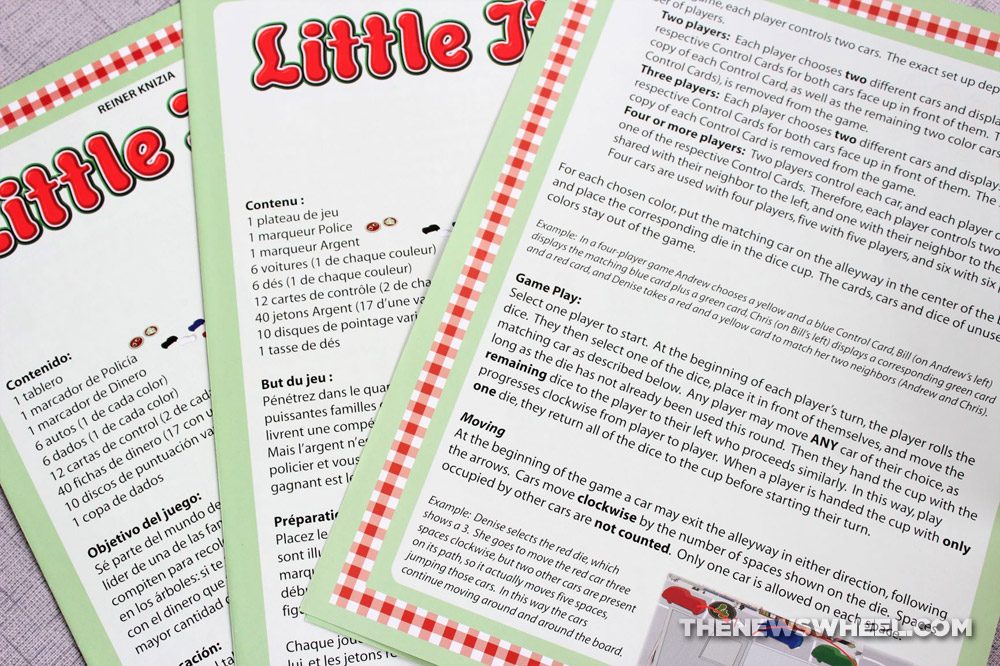
Little Italy is a really easy game to learn how to play. The instructions consist of two brief pages of rules and written in basic English. It is text-heavy and only includes one visual reference. It definitely could’ve used more pictorial guides and scenarios to make sure the text-based explanations were clear. Even without those, though, the game is simple enough to follow.

I had a lot more fun with Little Italy than I expected to. Despite its incongruent look and theme, it actually is a nifty, engaging game.
In some ways, it’s like a racing game in which everyone is driving a car in a circle around a track. But instead of the goal amounting to merely being the fastest car to travel the furthest ahead, the goal is to plan your movements to arrive at the right spot on the board at the right time. So, you have to chose which car to move on your turn to impair your opponents while also forcing them to profit you. Sharing ownership of cars with fellow competitors compounds the amount of planning and interaction needed to win the game — making Little Italy one of the more socially collaborative car games I’ve played.

I thought Little Italy would suffer from having a basic roll-and-move design with permanent spaces on the board where events always happen. But, in fact, knowing where the next cash payout or police location would pop up forced us to anticipate where to move when to activate spots at the right time. There’s a very small margin for victory, so you always have to weigh how your moves will impact everyone else.
The biggest flaw is the theme. The premise of the game doesn’t feel present in the game play (you don’t feel like a gangster taking money around town). Plus, the criminal subject matter keeps it from being a family classic.
I wouldn’t suggest seeking out Little Italy to purchase as a must-have game for your collection, but if you see it for sale and have children who need better games than Sorry or Life, this is a solid choice. It benefits from having a large group of players, and adults will be engaged just as much as kids.

Aaron is unashamed to be a native Clevelander and the proud driver of a Hyundai Veloster Turbo (which recently replaced his 1995 Saturn SC-2). He gleefully utilizes his background in theater, literature, and communication to dramatically recite his own articles to nearby youth. Mr. Widmar happily resides in Dayton, Ohio with his magnificent wife, Vicki, but is often on the road with her exploring new destinations. Aaron has high aspirations for his writing career but often gets distracted pondering the profound nature of the human condition and forgets what he was writing… See more articles by Aaron.

